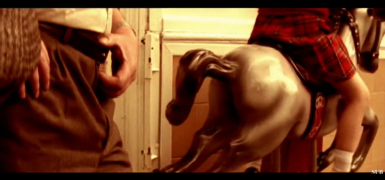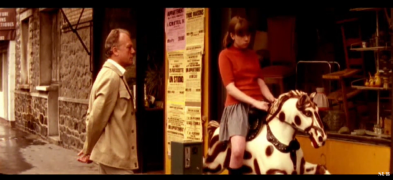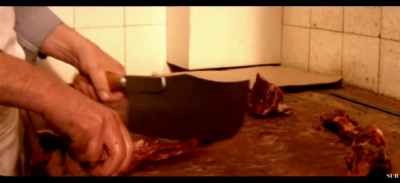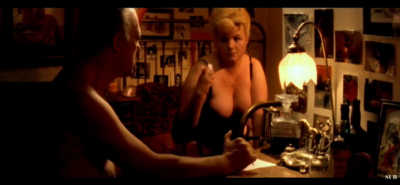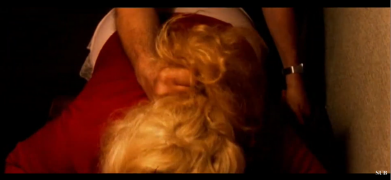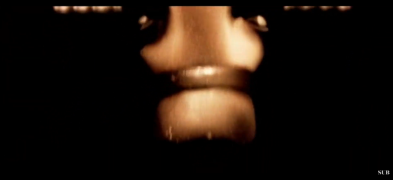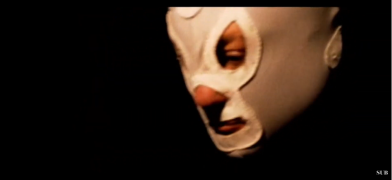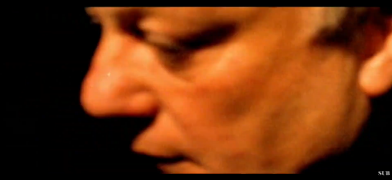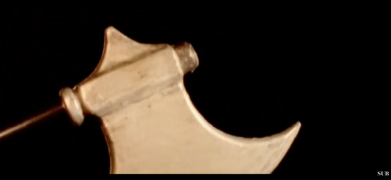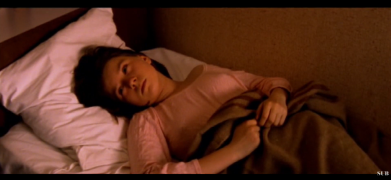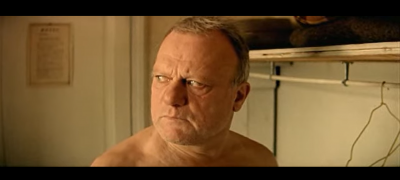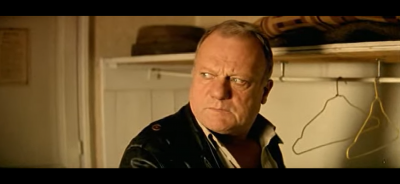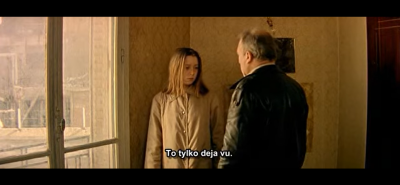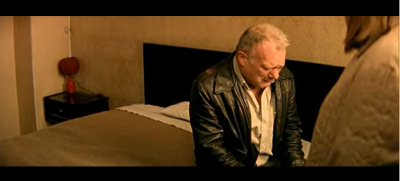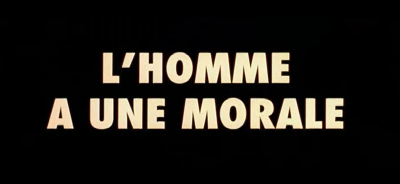Difference between revisions of "Reconstruction:I Stand Alone (Seul contre tous)"
Thaumasnot (talk | contribs) (Created page with "{{Reconstruction}} ''I Stand Alone'' is the second part of a diptych. In the first part entitled ''Carne'' (french slang for horse meat), we meet the butcher, who raises alone his daughter Cynthia. The growth of his incestuous thoughts parallels the growth of his daughter into a young woman, and is associated to a {{def|wooden horse}} for children. <gallery widths=300px mode=packed> File:Capture d’écran 2022-01-18 111835.png File:Capture d’écran 2022-01-18 113357...") |
Thaumasnot (talk | contribs) |
||
| Line 114: | Line 114: | ||
{{quote|People think they’re free? But freedom doesn’t exist. There are only laws that strangers made up for their own good, and that lock me into my misery. And among these laws, there’s one which says I shouldn’t love you, because you’re my daughter. And why? But this love, if they forbid it, it’s not because it’s evil, but because it’s too powerful. But in our case, it’s the only way I see. '''I love you, that’s all'''.|Les gens croient qu’ils sont libres? Mais la liberté ça n’existe pas. Il n’y a que des lois que des inconnus ont fabriqué pour leur bien, et qui moi me verrouillent dans mon malheur. Et parmi ces lois, il y en a une qui dit que je ne dois pas t’aimer, parce que tu es ma fille. Et pourquoi? Mais cet amour, on nous l’interdit, ce n’est sûrement pas parce que c’est mal, mais parce que c’est trop puissant. Mais dans notre cas, je ne vois que ça. '''Je t’aime, un point c’est tout'''.}} | {{quote|People think they’re free? But freedom doesn’t exist. There are only laws that strangers made up for their own good, and that lock me into my misery. And among these laws, there’s one which says I shouldn’t love you, because you’re my daughter. And why? But this love, if they forbid it, it’s not because it’s evil, but because it’s too powerful. But in our case, it’s the only way I see. '''I love you, that’s all'''.|Les gens croient qu’ils sont libres? Mais la liberté ça n’existe pas. Il n’y a que des lois que des inconnus ont fabriqué pour leur bien, et qui moi me verrouillent dans mon malheur. Et parmi ces lois, il y en a une qui dit que je ne dois pas t’aimer, parce que tu es ma fille. Et pourquoi? Mais cet amour, on nous l’interdit, ce n’est sûrement pas parce que c’est mal, mais parce que c’est trop puissant. Mais dans notre cas, je ne vois que ça. '''Je t’aime, un point c’est tout'''.}} | ||
So the monologue ends on a certain nihilism ({{c|I love you, '''that’s all'''}}), as it only contradicts (rather than argues against) what he says elsewhere of the {{ref|venality}} of all human relationships ({{c|pretending to love your wife, '''kids''' and friends… just like they pretend to love you}}). | So the monologue ends on a certain nihilism ({{c|I love you, '''that’s all'''}}), as it only contradicts (rather than argues against) what he says elsewhere of the {{ref|venality}} of all human relationships ({{c|'''pretending''' to love your wife, '''kids''' and friends… just like they '''pretend''' to love you}}). | ||
[[Category:Movie]] | [[Category:Movie]] | ||
[[Category:Gaspar Noé]] | [[Category:Gaspar Noé]] | ||
Latest revision as of 20:19, 23 January 2022
I Stand Alone is the second part of a diptych. In the first part entitled Carne (french slang for horse meat), we meet the butcher, who raises alone his daughter Cynthia. The growth of his incestuous thoughts parallels the growth of his daughter into a young woman, and is associated to a for children.
While the butcher runs the slaughterhouse over the years, as established by short sequences of him hacking at meat cuts always with the same motion,
Cynthia spends her time watching violence on TV where a masked character in a rather violent mood makes recurring appearances:
On the day Cynthia has her period for the first time, a boy tries to seduce her, appropriately next to the . The butcher soon learns of it, and, believing she was raped, assaults an innocent worker by mistake. He does some time in prison and must sell his apartment and the slaughterhouse in exchange for freedom. Following his release, he finds a job at a café where he is seduced by the owner.
The owner, now pregnant, offers to sell the café and open a slaughterhouse in another town. This is presented as a between her and Cynthia.
Despite his intense despise for her,
the butcher accepts the offer.
The film ends on a string of close-ups linking together a sex scene of the butcher taking the owner, the , the masked character, the butcher, a knife pointed , and finally Cynthia:
This string of associations is fleshed out in the sequel, I Stand Alone, as a prophecy of violence leading up to Cynthia. I Stand Alone starts with the butcher and the owner moving to her mother’s apartment in the north of France. The preamble evokes the butcher’s life made in Carne:
However, the slaughterhouse project doesn’t pan out, and following a violent altercation with the owner, he flees, with just a few bucks and a gun stolen from the mother. He hitch-hikes his way back to Paris.
The butcher slowly sinks in bitterness and depression; he can’t find work in this time of economic crisis, his friends, poor as well, can’t help him much. He runs out of money, and begins to feel the effects of hunger.
Some encounters excite his homophobic and racist tendencies. He also profoundly resents the of :
His diatribe emphasizes a between ’s morality and his own morality:
For him, pervades even family:
His hatred and despair lead him to contemplate going out in terrorist fashion:
But he decides to postpone his plans, as he has a moral debt towards Cynthia:
He uses a pretext to get her out of the orphanage. At the hotel, while she looks out the window, he gets the gun and toward her. But an then implies they had sex:
He then shoots at Cynthia, but she doesn’t die immediately, and agonizes instead. He begins to panic, and losing his sanity, looks at himself with disgust:
After a long descent toward madness where he fancies himself as the French President, he finally shoots his brains out. This is the culmination of an of violence that was prophesized in Carne, going back to his to live with the café owner instead of Cynthia.
We then rewind back to the point in the story just before the murder. This is indicated by a toward Cynthia with the clothes back.
The butcher seems to be back from having hallucinated the murder:
As he approaches Cynthia, we expect him to have sex with his daughter:
But after looking at her, he turns away, sits on the bed and cries:
Cynthia then sits next to him, the first time in the entire diptych she actually seems to do something by herself, and he breaks down in her arms. The screen then cuts to a black screen with the following message:
The mention of morality points out the fact that in both the murder scene (« Someone touched my daughter. He had no right ») and his (« I shouldn’t do this. I’m a good man and I should stay that way ») away from the of violence, the butcher was morally motivated, in his own way. The , between society’s morality and his, is exposed in his final thoughts:
While it is implied he’s going to have sex with his daughter as he fondles her, the movie stops short of it happening, unlike in the murder narrative, where the murder takes place after the sex. And while the butcher admits in the murder narrative that « [sex] wasn’t as beautiful as I believed, » his emotional breakdown in the narrative shows this isn’t going to be like the « thousand times » he had sex, moving the focus away from pure sex and more toward love:
So the monologue ends on a certain nihilism (« I love you, that’s all »), as it only contradicts (rather than argues against) what he says elsewhere of the of all human relationships (« pretending to love your wife, kids and friends… just like they pretend to love you »).
